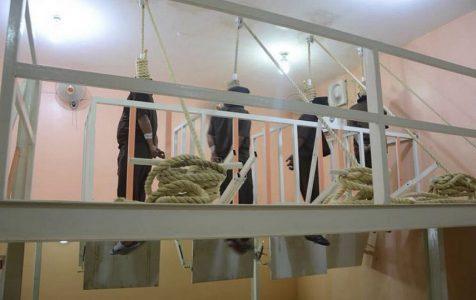
A neighbor’s word can lead to death row in Iraq’s Islamic State trials
More than a decade ago, Ismail Saleh says, a neighbor wanted to marry one of Saleh’s cousins. Following the custom of their clan in northern Iraq, she was meant to wed Saleh, so the family refused. And thus, he says, a feud was born.
Saleh now sits on death row in Baghdad, sentenced to hang after being accused of fighting for the Islamic State group, a charge he steadfastly denies. The chief evidence against him: the word of that neighbor.
“Sometimes I wake up and for a moment I feel that this death sentence and me being here is just a bad dream,” the 29-year-old told The Associated Press in an interview in a Baghdad prison.
Death sentences are being issued at a dizzying rate in Iraq’s rush to prosecute and punish suspected members of the Islamic State group, with more than 3,000 handed out over just the past few years. About 250 people condemned for alleged IS ties have been hanged since 2014, including 101 only last year.
Any allegation of having taken up arms for the group can bring the ultimate penalty, even while the evidence is thin and cursory.
The heavy reliance on informants is particularly glaring, given the potential that some are motivated by personal grudges. Informants never appear in court; their claims are passed to the judges in dry, written reports from intelligence officials with no hint of their possible motivation.
Thousands of defendants are pushed through the courts at a rapid clip, with individual trials as short as 10 or 15 minutes and a third of the cases ending in the death penalty. Witnesses are very rarely called and no forensic evidence presented, raising the likelihood of innocent people going to the gallows.
The cases are so flimsy that President Fuad Masum has refrained from ratifying many executions, which is required by law before they can be carried out, a senior official in the president’s office told the AP.
“We have doubts,” said the official, who spoke on condition of anonymity because he was not authorized to discuss the issue.
“We didn’t find solid proof in some of the cases we’ve studied,” he said. “We attended some hearings and found the cases are ruled on quickly in one hearing.”
Still, the pressure is rising for executions to be carried out even more rapidly, including from Prime Minister Haider al-Abadi. Last month, 13 people accused of IS ties were hanged within three hours of the president ratifying the death documents — an unusually quick turnaround.
The AP spoke to Ismail Saleh and two other Iraqis accused of being Islamic State group fighters who were sentenced to death, as well as to their families in and around the northern city of Mosul.
Like nearly all the other defendants, all three denied ties to IS. Not all the details of their accounts could be independently confirmed, but their stories — which raise reasonable doubts over their guilt — were not closely examined in court before they were condemned to die, underscoring the system’s weakness.
That judicial haste was readily apparent when the AP attended three consecutive days of court sessions in Baghdad in late May.
Source: TOI





